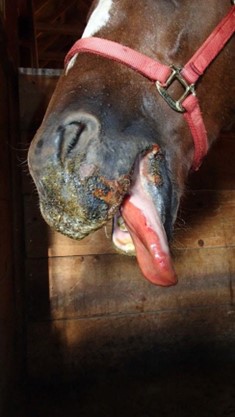
Disease can affect all hooved livestock and can also spread to humans
By Miriam Raftery
May 22, 2023 (San Diego) – Fifteen properties in San Diego County are under quarantine by the U.S. Department of Agriculture, after six cases of Vesicular Stomatitis Virus (VSV) have been confirmed in San Diego County and testing is underway on another nine suspected local cases, according to the USDA website on the disease. There are also two confirmed cases and two suspected cases in Riverside County, where four properties are quarantined. These are the only areas in the U.S. with current cases of VSV.
The first local case in this outbreak occurred May 17 in Ramona, according to the San Diego Union-Tribune. While all of the local cases so far are in horses, the disease can also afflict donkeys, cattle, pigs, sheep, goats, llamas, alpacas or other hooved livestock.
The quarantines will last at least 14 days after the last known case. However blisters on mouths and hooves can take up to two months to resolve.The quarantines mean no transporting animals to or from the impacted properties will be allowed until a veterinarian has cleared animals for travel. Some states and livestock events such as horse shows may prohibit animals from the impacted areas from participating even if there is no known exposure, so check with show organizers before traveling to any livestock even
 The disease is spread by biting insects, primarily flies, so fly control is important. But it can also spread through shared feeding or water troughs, and through commonly touched surfaces. Humans can also contract the virus by touching infected animals, so wear gloves if handling the mouth, nose or hooves of livestock.
The disease is spread by biting insects, primarily flies, so fly control is important. But it can also spread through shared feeding or water troughs, and through commonly touched surfaces. Humans can also contract the virus by touching infected animals, so wear gloves if handling the mouth, nose or hooves of livestock.
In livestock, the diseases causes severe blister-like lesions that are painful and often cause animals to stop eating and lose weight, forming crusty scabs, but it is rarely fatal. It can also cause temporary lameness.
There is no vaccine, but VSV can be treated with anti-inflammatory drugs. Secondary infections may require antibiotics. If your animal has trouble eating, softening grain in warm water may be helpful, or using hay cubes softened in water to help afflicted horses.
In humans, the disease cause flu-like symptoms such as fever, muscle aches, headache, and malaise.
Disinfect your hands and boots after handling an animal suspected of having the disease, and also change and wash your clothes, the USDA advises.
t.








Recent comments